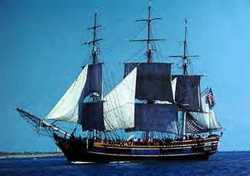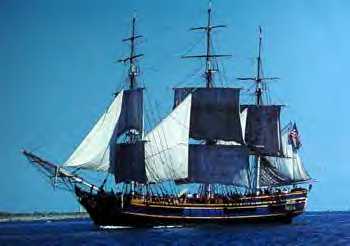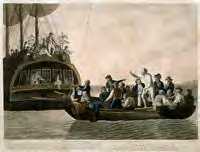Midshipman aboard the Bounty.
A loyalist.
Hayward was 27 years old when he came on board the Bounty. Both he and his young friend John Hallett came to the ship through the influence of Bligh's wife Betsy; the families of both had been friends of the Bethams for some time.
Hayward seems to have been lazy and undependable. He and Hallett were universally disliked on the Bounty because of their arrogance. Hayward had a propensity for sleeping on duty: on Tahiti Bligh put him in irons for having been asleep while on watch when the deserters left the ship.
Nevertheless Hayward and Bligh seem to have liked each other. After Bligh's hysterical outburst over the supposedly missing coconuts, the officers had agreed among each other not to accept a dinner invitation from the captain. Hayward broke the agreement and dined with him the evening before the mutiny. Bligh commended him highly after the open-boat voyage, and Hayward was totally in support of Bligh during the trial of the accused mutineers.
Hayward was the mate of Christian's watch. On the morning of the mutiny he was again sleeping on duty (on the arms chest) when Norman called out that he had seen a giant shark. This awakened Hayward and although he was at first interested in catching the shark, he soon noticed that some of the men came on deck armed and asked them what was going on. Christian told him "Mamu!" ("Shut up" in Tahitian) and that took care of Hayward; he never made any attempt to alert Bligh.
When the loyalists were to go into the launch he, and Hallett, tearfully begged to be allowed to stay on board. They were too disliked by the crew, however; nobody wanted them on board.
Not only did Hayward reach England safely, he soon returned as third lieutenant in the Pandora in search of his former shipmates. The dislike he had developed for them, even for the loyalists, was immediately evident when the ship reached Tahiti. Towards Heywood, especially, he seems to have developed feelings close to hatred. When Heywood – who had stayed on Tahiti with the other loyalists and some of the mutineers – came on board the Pandora and wanted to greet Hayward as an old shipmate, Hayward turned a cold shoulder and would have nothing to do with him. Heywood later wrote:
"Having learned from one of the natives that our former messmate, Mr. Hayward now promoted to the rank of lieutenant was on board, we asked for him, supposing he might prove the assertions of our innocence. But he, (like all worldlings when raised a little in life) received us very coolly and pretended ignorance of our affairs. Appearances being so much against us, we were ordered to be put in irons and looked upon oh! Infernal words! – as piratical villains."
At the trial of the accused mutineers, Hayward damaged Heywood's case by making it clear that he considered Heywood a mutineer because the latter had remained on board.
Hayward was later drowned in the China Sea while commanding the sloop-of-war Swift when she foundered in a typhoon with all hands lost.
Midshipman aboard the Bounty.
A loyalist.
Hayward was 27 years old when he came on board the Bounty. Both he and his young friend John Hallett came to the ship through the influence of Bligh's wife Betsy; the families of both had been friends of the Bethams for some time.
Hayward seems to have been lazy and undependable. He and Hallett were universally disliked on the Bounty because of their arrogance. Hayward had a propensity for sleeping on duty: on Tahiti Bligh put him in irons for having been asleep while on watch when the deserters left the ship.
Nevertheless Hayward and Bligh seem to have liked each other. After Bligh's hysterical outburst over the supposedly missing coconuts, the officers had agreed among each other not to accept a dinner invitation from the captain. Hayward broke the agreement and dined with him the evening before the mutiny. Bligh commended him highly after the open-boat voyage, and Hayward was totally in support of Bligh during the trial of the accused mutineers.
Hayward was the mate of Christian's watch. On the morning of the mutiny he was again sleeping on duty (on the arms chest) when Norman called out that he had seen a giant shark. This awakened Hayward and although he was at first interested in catching the shark, he soon noticed that some of the men came on deck armed and asked them what was going on. Christian told him "Mamu!" ("Shut up" in Tahitian) and that took care of Hayward; he never made any attempt to alert Bligh.
When the loyalists were to go into the launch he, and Hallett, tearfully begged to be allowed to stay on board. They were too disliked by the crew, however; nobody wanted them on board.
Not only did Hayward reach England safely, he soon returned as third lieutenant in the Pandora in search of his former shipmates. The dislike he had developed for them, even for the loyalists, was immediately evident when the ship reached Tahiti. Towards Heywood, especially, he seems to have developed feelings close to hatred. When Heywood – who had stayed on Tahiti with the other loyalists and some of the mutineers – came on board the Pandora and wanted to greet Hayward as an old shipmate, Hayward turned a cold shoulder and would have nothing to do with him. Heywood later wrote:
"Having learned from one of the natives that our former messmate, Mr. Hayward now promoted to the rank of lieutenant was on board, we asked for him, supposing he might prove the assertions of our innocence. But he, (like all worldlings when raised a little in life) received us very coolly and pretended ignorance of our affairs. Appearances being so much against us, we were ordered to be put in irons and looked upon oh! Infernal words! – as piratical villains."
At the trial of the accused mutineers, Hayward damaged Heywood's case by making it clear that he considered Heywood a mutineer because the latter had remained on board.
Hayward was later drowned in the China Sea while commanding the sloop-of-war Swift when she foundered in a typhoon with all hands lost.
Advertisement
Records on Ancestry
Advertisement





